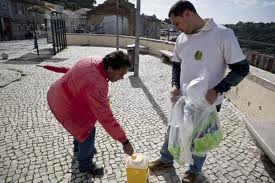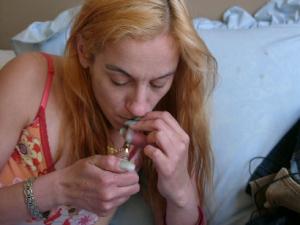The Portugal Effect
The Portugal Effect

Over a decade ago Portugal decriminalised drug possession – any type of drug from marijuana to cocaine and heroin were decriminalised with some fantastic but not particularly surprising results.
See what the new Director of International Network of People who Use Drugs (INPUD) had to say about the Portugal effect;
Drug Use Decriminalization in Portugal:
In 2000 Portugal approved and implemented a new law, the law 30/2000 that decriminalized the use of any drug. decriminalization means that it is not a crime to use a drug, whether cannabis, cocaine or heroin. The person instead of being arrested by the criminal system is now treated by the health system.
The system has 3 stages:
1) It starts when the person is stopped by the police in possession of drugs. At this point the police take your details and refer the drug user to what we call in Portuguese a ‘comissao de dissuasao da droga’ which is a form of drug advice centre. This is an administrative sanction rather than than criminalising the person.
2) The second stage is that the drug user is required to attend the drug advice centre which is staffed by lawyers and psychologists. There the drug user is assessed and engaged in a conversation about their drug use. If they are a sporadic user they will pay a fine and then the case is finished.
3) However, for habitual users there is a third option. They are referred to drug treatment centre and are not fined. At the drug treatment centre they talk with a psychologist or psychiatrist and then choose if they want to engage in drug treatment or not.
The fact that a person who uses drugs is now not a criminal had fantastic results, allowing a greater stabilization of this person including the opportunity to engage in drug treatment. As the people who use drugs start to go much more often to the drug treatment centre so they start to use the public health care system free from the fear of criminalization and the associated stigma and discrimination. In the past many drug users hid from public institutions because they were fearful of seeking help. The drug user has become a citizen with full rights who may also use drugs.
To read the full speech go to http://inpud.wordpress.com where Jorge discusses availability of syringes, dealings with police, and access to various kinds of treatment in greater detail!
See what Sir Richard Branson, human rights activist, and founder of Virgin records had to say about Portugal's independent stand on the world stage against continuing to follow the world into the drug war;
Visited Portugal, as one of the Global Drug Commissioners, to congratulate them on the success of their drug policies over the last 10 years.
Ten years ago the Portuguese Government responded to widespread public concern over drugs by rejecting a “war on drugs” approach and instead decriminalized drug possession and use. It further rebuffed convention by placing the responsibility for decreasing drug demand as well as managing dependency under the Ministry of Health rather than the Ministry of Justice. With this, the official response towards drug-dependent persons shifted from viewing them as criminals to treating them as patients.
Now with a decade of experience Portugal provides a valuable case study of how decriminalization coupled with evidence-based strategies can reduce drug consumption, dependence, recidivism and HIV infection and create safer communities for all.
I will set out clearly what I learned from my visit to Portugal and would urge other countries to study this:
In 2001 Portugal became the first European country to officially abolish all criminal penalties for personal possession of drugs, including marijuana, cocaine, heroin and methamphetamines.
Jail time was replaced with offer of therapy. (The argument was that the fear of prison drives addicts underground and that incarceration is much more expensive than treatment).
Under Portugal’s new regime, people found guilty of possessing small amounts of drugs are sent to a panel consisting of a psychologist, social worker, and legal adviser for appropriate treatment (which may be refused without criminal punishment), instead of jail.
Critics in the poor, socially conservative and largely Catholic nation said decriminalizing drug possession would open the country to “drug tourists” and exacerbate Portugal’s drug problem; the country has some of the highest levels of hard-drug use in Europe. The recently realized results of a report commissioned by the Cato Institute, suggest otherwise.
The paper, published by Cato in April 2011, found that in the five years after personal possession was decriminalized, illegal drug use among teens in Portugal declined and rates of new HIV infections caused by sharing of dirty needles dropped, while the number of people seeking treatment for drug addiction more than doubled.
(for full article... http://drugpolicy.ca/2011/12/sir-richard-branson-time-to-end-the-war-on-...)
Since the 10 year anniversary of Portugal's pro human rights approach, other nations have found the courage to also speak out. And activists from around the world continue their work towards ending the war on drug users. From Poland to Russia and Mexico to Canada, new approaches to centuries of criminalisation are on the rise! About time!!! There is even some talk from those at the front lines and from policy makers about pulling out of the anti-human rights UN declarations.
Hear what the former president of Mexico had to say about the harm caused to his country and to others as a direct result of the American drug war.
http://stopthedrugwar.org/speakeasy/2011/oct/29/video_former_mexican_president_s
In Canada :
“four former mayors of Vancouver endorsed the Stop the Violence B.C. coalition in the form of an open letter addressed to B.C.'s elected officials. The letter encouraged politicians to voice their sup-port for taxation and regulation of cannabis as a strategy to reduce gang violence. Despite a recent Angus Reid poll showing that only 12 per cent of British Columbians support existing marijuana laws, with almost 70 per cent supporting the taxation and regulation of marijuana, the B.C. Liberals and their NDP opposition have yet to show meaningful leadership on this issue. Apparently, they are concerned that voicing a progressive opinion could lead to a bleeding of support to the emerging B.C. Conservative Party.”
full article at: http://endprohibition.ca/group/endprohibition/theres-nothing-conservative-about-banning-pot
I am grateful these “leaders” are finally stepping up and speaking out. But the question really remains, why did they not speak out while in power, when they had more direct access and influence to institute real change? Alas, the fickle game of politics, always stepping on someones toes while desperately trying not to.
And least we forget, it could get worse! Indeed it is much worse for drug users in countries around the world, which not only criminalise drug users, but also demonize and promote hatred of them. With the outward intent of keeping them on the fringes of society, making them ill and outright killing them. Countries like China and Russia have particularly abysmal records.
Drug Users Demonized, and Left to Die in Russia
We can all learn a lot from Portugal, but none perhaps more than Russia. Russia has one of the most abysmal, and harmful policies in the world with regards to drug user human rights. Most governments care not a bit for drug users generally and tend to look upon problematic drug use as an individual rather than a community issue. However most governments also feel pressure, if for no other reason than preserving their public face – to address the HIV/AIDS epidemic in regards to the drug using and other marginalized populations.
Not so in Russia. Russian leads the world with the highest rate of HIV infection among the drug using population, at 80%. Activists around the world demonstrated this past Dec 6 to tell Russia that the world is watching and we are disgusted with their leaders.
Users United Around the Globe in Support of their Russian Peers
Posted on December 5, 2011
New York City Kicked off the global protest on the eve of World AIDS Day, and were followed by 12 other cities
On World Aids Day, 2011, just a few short days ago, harm reduction organisations led by people who use drugs and supported by the International Network of People who Use Drugs(INPUD) gathered outside Russian embassies in cities across the world in the largest ever global show of solidarity by and for people who use drugs.
The protests, entitled ‘Shame Russia Shame’, was directed at Russia’s highly controversial drug policies which are believed to be driving the EEC regions HIV and TB epidemics. Injecting drugs with contaminated equipment is driving Russia’s HIV epidemic, now the fastest growing in the world and it is reflected in the numbers; as many as 80% of new infections are occurring amongst people who inject drugs (PWID), in a total HIV positive population of approx 1.3million. With this in mind, recent projections forecast an additional 5 million people could become infected with HIV in the near future, unless Russia drastically transforms the way it is dealing with its HIV pandemic.
INPUD member Erin O’Mara says Russia’s drug policies are ‘brutalising’
Erin O’Mara, (editor of UK’s Black Poppy Magazine and INPUD member) who coordinated the global protest said the human catastrophe unfolding in Russia is almost indescribable in its brutality and neglect.”Russia has more heroin users than anywhere in the world yet because they offer no safe alternatives such as methadone or buprenorphine, and corruption has driven the price of heroin above what many Russian users can afford, new home made concoctions like desomorphine (nicknamed krokodil) are gaining ground, with devastating health consequences for the user”. Erin adds, “To scratch the surface of Russian drug policies, you find some of the most brutalizing policies in the world; where their should be harm reduction, regulation, treatment and support, there is neglect, abuse, imprisonment, disease and death.”
(full article at, http://inpud.wordpress.com/2011/12/06/users-united-around-the-globe-in-s...)
Poland "Treatment Not Jail" Drug Law Now in Effect
A step in the right direction? I think it probably is. But this will largely depend on how quickly activists are able to address provisions for forced treatment as opposed to imprisonment. Anywhere we are held against our will, it is a prison. Though I suspect much like here in Canada, the treatment centres are a lot nicer in food, accommodation and some staff members.
by Phillip Smith, December 09, 2011, 02:02pm
Posted in:
An amendment to Poland's drug law that allows prosecutors to divert drug users to treatment instead of prison went into effect Friday, PolskieRadio reported.

This crack smoker could get treatment instead of jail under a new Polish law (Image: Wikimedia.org)
The amendment lets prosecutors bypass the courts in a "treat, not punish" approach to drug use when confronted with people arrested in possession of small amounts of drugs. A person arrested with personal use quantities of drugs can now be immediately referred to a therapist, and prosecutors are compelled to gather information on the extent of the person's drug problem.
National Bureau for Drug Prevention spokeswoman Barbara Wilamowska told PolskieRadio she believes the new approach will result in fewer prosecutions.
Agnieszka Sieniawska, head of the Polish Drug Policy Network (PSPN), said the new system will be quicker, cheaper and more efficient.
But while the amendment represents a kinder, gentler approach to drug users, that same law increases penalties for drug trafficking.
The amendment comes into effect a month after two Polish Nobel Prize laureates, former president Lech Walesa and poet Wislawa Szymborska, signed a statement calling for lighter punishments for those arrested for personal use.
Meanwhile, a newly formed liberal political party, Palikot's Movement, is calling for the full legalization of soft drugs. It won a surprising 10% of the vote in the October general election. But Prime Minister Donald Tusk, head of the current coalition government, has said that his Civic Platform Party opposes legalization.


